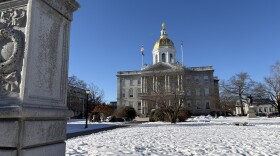This story was originally produced by the New Hampshire Bulletin, an independent local newsroom that allows NHPR and other outlets to republish its reporting.
Facing federal deadlines to spend pandemic relief money or return it, the Department of Energy has proposed making one-time $405 payments to some low-income households to offset the cost of electricity, which will spike for many in August.
The Executive Council is set to review that request when it meets Wednesday. The department would cover the one-time payments with $8.8 million in pandemic aid the state received for its Low-Income Home Energy Assistance Program, or LIHEAP.
The department designed the program to use the funds before the Sept. 30 deadline, according to the department’s request.
The payment would go to individuals and households already enrolled in the assistance program to cover previously unpaid electric bills or a current bill, or as a credit to offset future bills. People who are eligible will automatically receive a bill credit without needing to apply, according to Chris Ellms, deputy commissioner of the Department of Energy.
This isn’t a typical use of the LIHEAP program, which helps households struggling to afford heating fuels. A separate state program is typically used for electric assistance.
Those who earn 60 percent of the state median income are eligible for assistance paying for fuel, electricity, and weatherization. A single person earning $38,969 or less would be eligible for assistance, and for a family of four, the cutoff is $74,941, according to the department’s website.
Given high fuel costs last winter, the congressional delegation secured an extra $35 million in ARPA funds, on top of the program’s typical $25 million to $28 million budget.
But even though fuel prices have climbed and the program increased benefits by 60 percent last year, more than $8.8 million remains unspent.
New Hampshire Bulletin is part of States Newsroom, a network of news bureaus supported by grants and a coalition of donors as a 501c(3) public charity. New Hampshire Bulletin maintains editorial independence. Contact Editor Dana Wormald for questions: info@newhampshirebulletin.com. Follow New Hampshire Bulletin on Facebook and Twitter.







